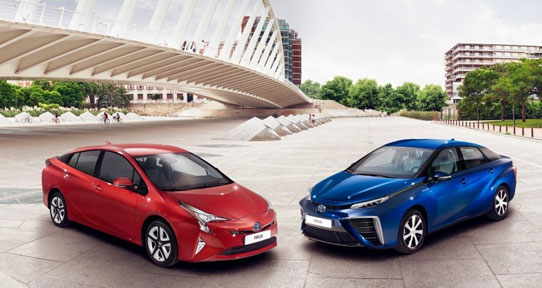Toyota: Prius, Mirai lead innovation
 Toyota Motor Corporation is the world's leading car-maker, though
Volkswagen is likely to overtake it this year in terms of unit sales
despite its diesel emission scandal according to a report in the Forbes
magazine. Toyota Motor Corporation is the world's leading car-maker, though
Volkswagen is likely to overtake it this year in terms of unit sales
despite its diesel emission scandal according to a report in the Forbes
magazine.
Toyota, which has held the top crown for the past four years,
published its global sales and production data for April last week
showing that sales through the first four months of the year were about
90,000 units behind VW, which was the top seller.
According to company figures provided by car makers from January
through April, Volkswagen sold 3,361,600 units, Toyota - 3,271,970 units
and General Motors - 3,146,667 units. Projections show that VW will beat
Toyota to the crown this year.
Three brands
Toyota is headquatered in Aichi, Japan and has manufacturing plants
in Japan and many other countries. Toyota also makes Lexus brand luxury
cars and Hino brand trucks, while Daihatsu is a Toyota subsidiary. All
three brands are available worldwide, including Sri Lanka.
It is also the most popular car brand in many countries including Sri
Lanka, although Suzuki's Indian made vehicles are the biggest sellers
here. Toyota's biggest seller globally is the Toyota Corolla, which has
been manufactured since the 1970s.
Toyota has blazed a trail in inventions and innovations since it was
founded 78 years ago by Kiichiro Toyoda, whose grandson Akio Toyoda is
the incumbent of CEO of Toyota Motors. (Legend has it that Toyoda was
reluctant to name the company after himself, hence the slight change to
'Toyota'). If the patent output is any indication, Toyota Motor Corp. is
positioned to dominate the global market for fuel cell, electric and
hybrid vehicles.
 The Japanese automaker has been churning out technology and process
patents far ahead of its competitors. From 2011 through 2015, Toyota and
its engineers were granted 9,807 patents for inventions related to
alternative-powered vehicles, a new Thomson Reuters study concludes. The Japanese automaker has been churning out technology and process
patents far ahead of its competitors. From 2011 through 2015, Toyota and
its engineers were granted 9,807 patents for inventions related to
alternative-powered vehicles, a new Thomson Reuters study concludes.
As part of this innovative streak, it produced the world's first
petrol-electric hybrid car in 1997 - the Toyota Prius. Now in its fourth
generation and just launched in Sri Lanka, it has just been found to be
the hybrid car with the best mileage by Consumer Reports magazine.
The 2016 Toyota Prius has better fuel economy than any car Consumer
Reports has tested, besting the 16-year-old Honda Insight by a single
mile per gallon.
CR found the new Prius scored an average of 52 mpg (5.4 litres per
100 km) handily beating the 44 mpg made by the 2015 Prius.
That is because the new Prius is more aerodynamic, has a better
battery, and uses the on-board electricity more efficiently. In a 65 mph
(approx 110 kmph) highway test, the 2016 Prius achieved 59 mpg (4.8
litres per 100 km), a better rating than any diesel car the magazine has
ever tested. In city tests, it notched a respectable 43 mpg. Toyota
manufactures a few other hybrids including the Axio, RAV4, Voxy and
Prius C (Aqua).
Hybrid sales
Toyota last week announced in a news release that its cumulative
global hybrid sales through from August 1997 to April 2016 tallied 9.014
million.
Toyota has also launched a zero-emission (actually, water vapitr is
emitted) hydrogen fuel cell powered car called the Mirai ('future' in
Japanese) in Japan, USA and a few other countries where hydrogen filling
stations are also available.
Analysts expect hydrogen cars to go mainstream only after a decade,
given the infrastructure challenges. Only a very few countries and
regions have hydrogen filling stations at present.
The battery research, announced this month, tweak the chemistry of
next-generation power packs for denser energy storage to deliver longer
drives for electric cars and hybrids. Toyota is researching the use of
magnesium, in place of lithium, as the base chemical for batteries that
could appear in the next 20 years.
Rival Nissan is looking at additives that will improve the
performance and energy capacity of today's lithium batteries.
Like all other car makers, Toyota has realised the changing dynamics
of the car industry and the ownership model. With pay-per-ride services
such as Uber (now available in Sri Lanka), people are no longer willing
to buy cars that are expensive to maintain.
Therefore, Toyota recently announced an investment partnership with
Uber soon after rival Volkswagen said it was investing US$ 300m into Tel
Aviv-based ride-sharing app called Gett and General Motors announced it
was investing US$ 500 million into Lyft, Uber's biggest direct
competitor. |

